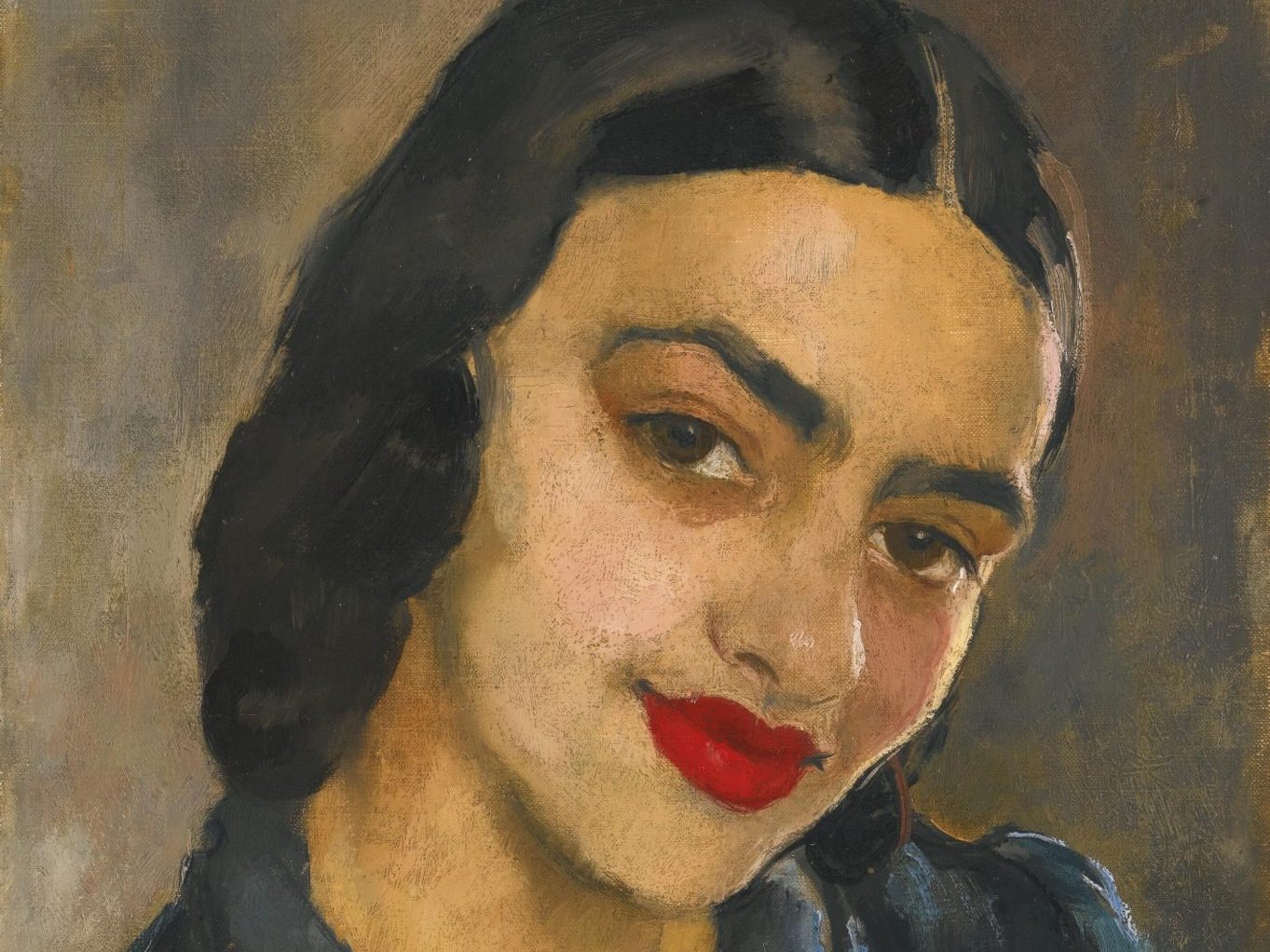Summary
- Silhouettes of famous Indian women artists along with their works
- Artists discussed: Amrita Sher-Gil
- B Prabha
- Arpita Singh
- Arpana Caur
- Anjolie Ela Menon
- Nalini Malani
- Rini Dhumal
- Bharti Kher
- Anju Dodiya
- Rekha Rodwittiya
- Meetali Singh
- Chitra Ganesh
Amrita Sher-Gil
This changed with the arrival of Amrita Sher-Gil, literally and metaphorically. Flashing through the horizon of Indian art like an incandescent shooting star, she single-handedly became a tour de force who put Indian art on the global map. However, her oeuvre, heavily inspired by women around her, became the cornerstone of her art practice.
Born in Hungary in 1931, an Indian woman artist Sher-Gil started to draw at an early age, and throughout her brief life and career, women continued to be her primary muse. She collected a myriad of experiences through the agency of her art to give insights into the lives of women from across social, economic, and cultural strata.
While in Paris, she painted several portraits and figure studies for which she used many of her friends as her subjects. Her first major breakthrough, executed while she was studying Ecole Nationale des Beaux-Arts in Paris, also featured women. Titled Young Girls, it was a portrait of her sister Indira and her friend Denise Proutaux. With her choice to depict her sister in a dress and her friend topless, Sher-Gil portrayed the contrast between boldness and demureness in women. This work, which is now a part of the national collection, won her several accolades including a gold medal at the Grand Salon in Paris. She also became the youngest and the only Asian member ever to join the Salon. Amrita Sher-Gil created a large repository of self-portraits, capturing herself in sometimes joyous and other times somber and pensive moods.
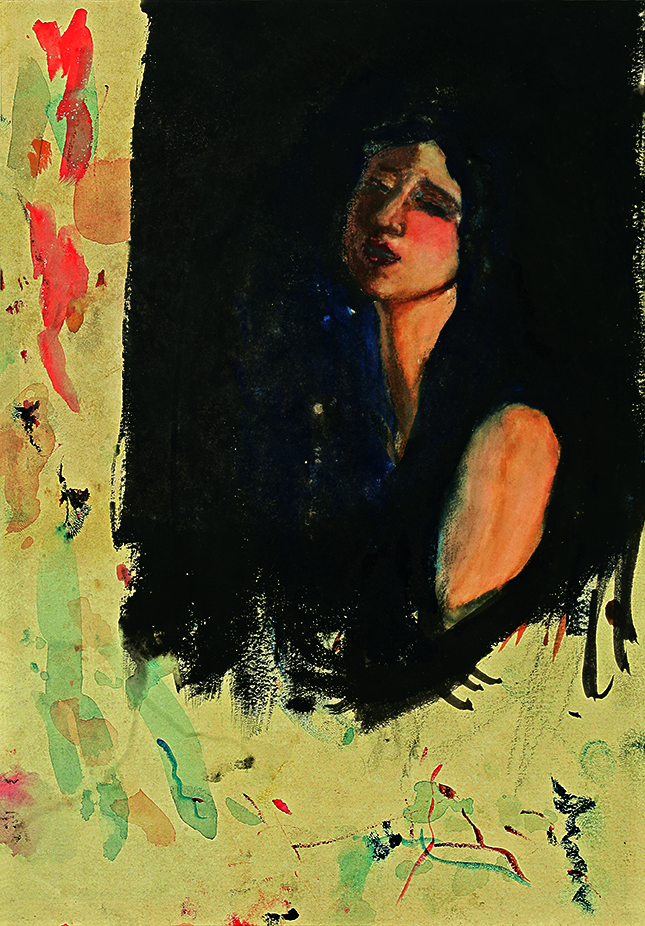
While her style radically changed after she moved to India in 1934, her art was continually devoted to depicting women. Describing her technique as becoming more “fundamentally Indian”, she said the purpose of her art was,
to paint those silent images of infinite submission and patience, to depict their angular brown bodies strangely beautiful in their ugliness, to reproduce on canvas the impression their sad eyes created on me.
With her indomitable spirit and nonchalant confidence, Amrita Sher-Gil inspired generations of both male and female artists. However, her artistic exploration of womanhood set the course for the emergence of Indian art which was not only by women artists but was also about women.
B Prabha
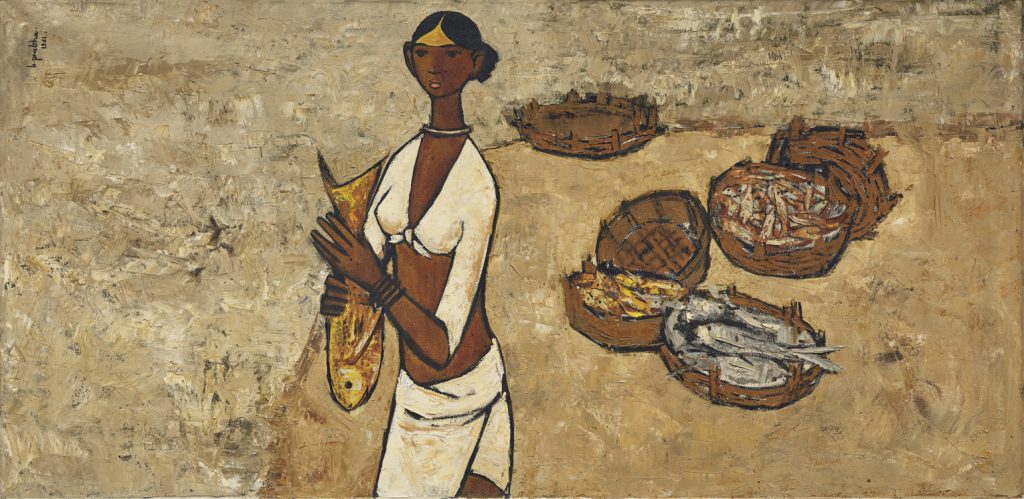
B Prabha, A Good Catch, 1961. Asta Guru.
For instance, artist B Prabha came to be highly revered for her depiction of fisherwomen that continuously featured in her work and became the artist’s perennial leitmotif. Capturing their crestfallen gaze, protracted figure, and stoic guise, the women in B Prabha’s work embody the plight of women in India and how they endure through the daily hustle of life with a dignified and steadfast silence. In one of her interviews, the artist famously said,
I have yet to see one happy woman.
Arpita Singh
One of the very few artists from this generation who is still practicing, Arpita Singh over the course of her career, has been devoted to portraying the various shades of emotions that touch the lives of women in her country and in the world in general. Subsuming a range of historical, mythological, as well as contemporary references, Arpita Singh’s canvases are crossroads of whimsical components that often render them as a dreamlike feeling. She dwells on different facets of familial life like motherhood, love, loss, and aging in a juxtaposition to the personal and the political. She does so by transporting characters from her personal narratives into the scenes of social and geo-political upheavals, such as mass migration and acts of violence that she witnessed across the world.
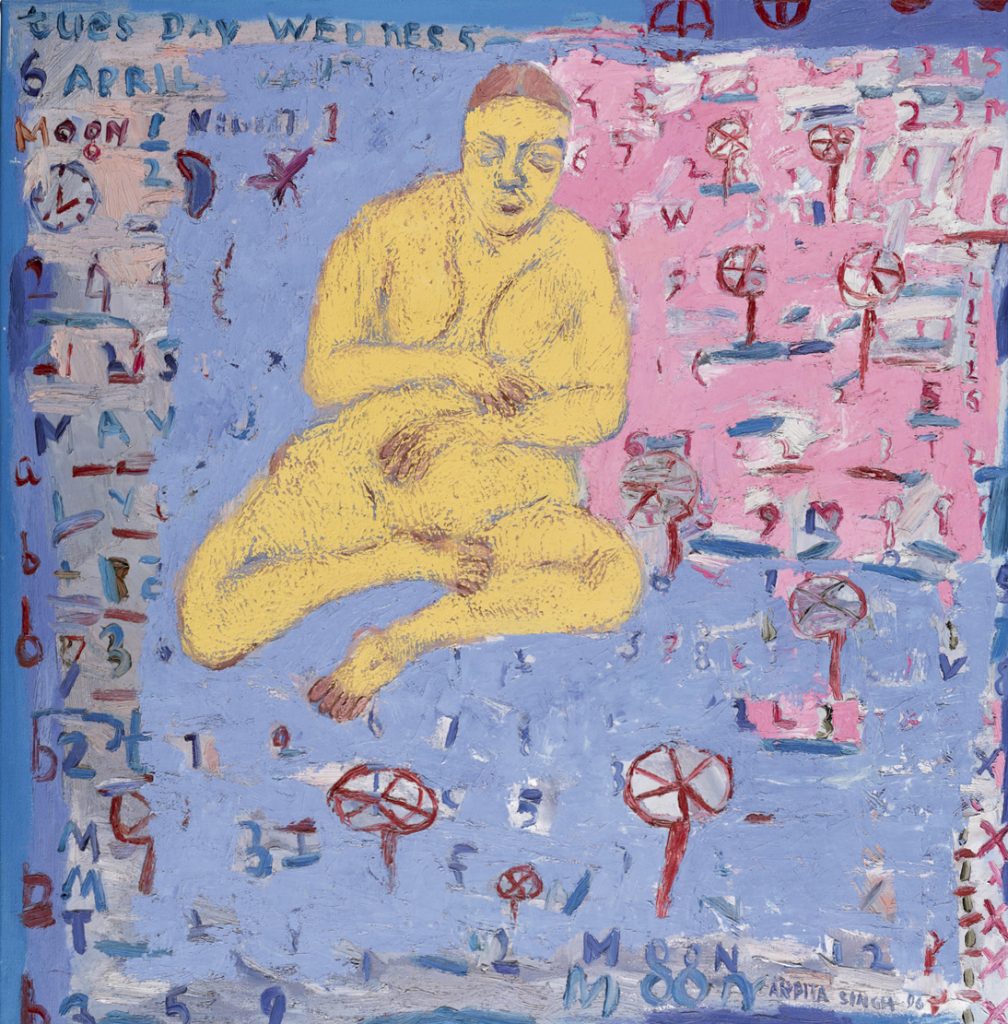
Arpita Singh, Tuesday Wednesday, 1996. Asta Guru.
Arpana Caur
Artworks by Indian woman artist Arpana Caur takes a view of feminine and femininity by positioning women in the context of contemporary culture. Devoid of sexual metaphors or connotations, women maneuvering through every day is a common subject for the artist. With their elongated hands symbolizing strength and empowerment, the large-eyed women in Arpana Caur’s paintings are also in harmony with nature.
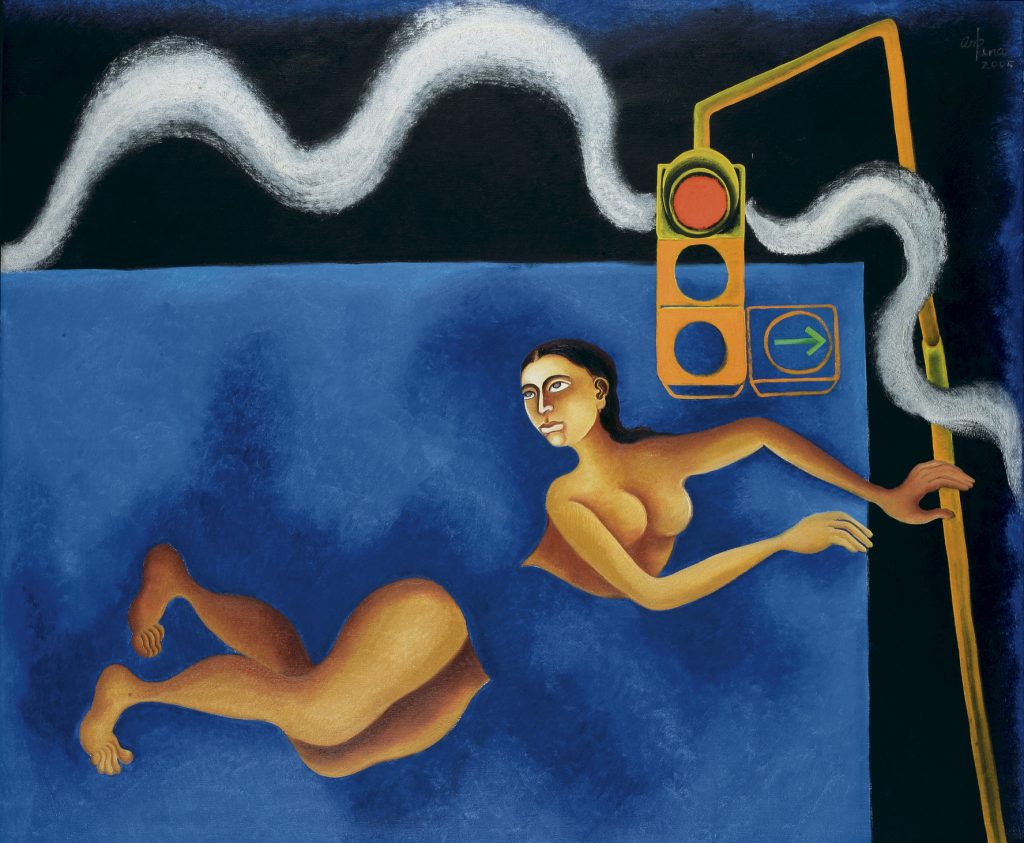
Arpana Caur, Sohni, 2005. Asta Guru.
Anjolie Ela Menon
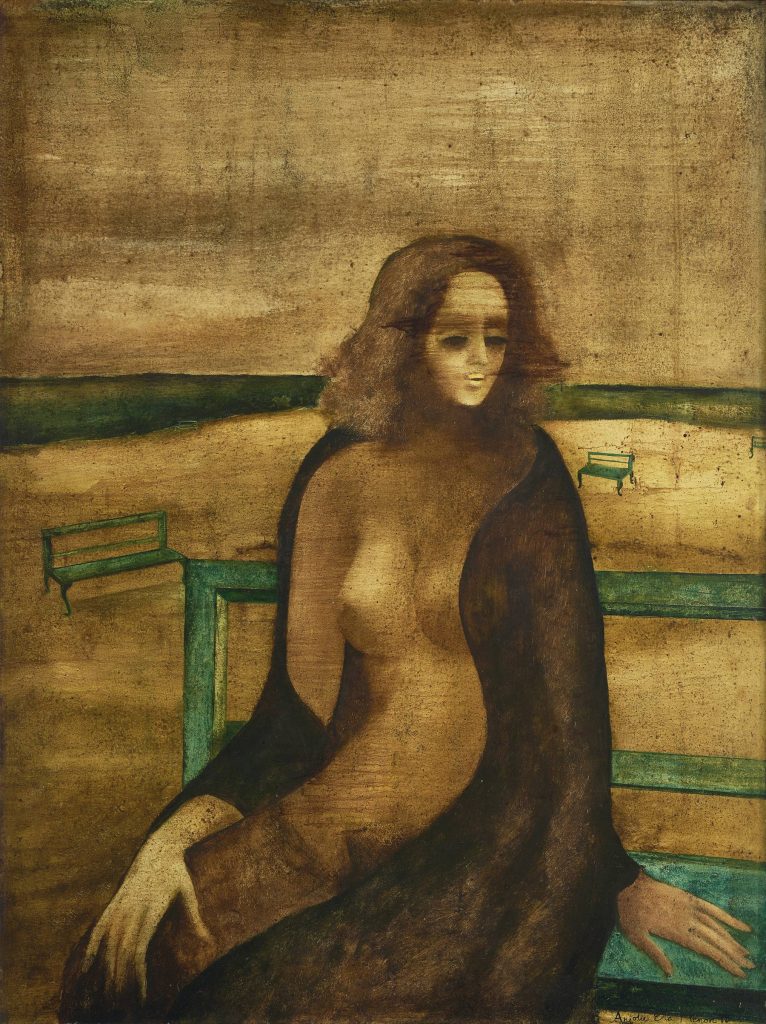
Anjolie Ela Menon, Untitled, 1978. Asta Guru.
In a career spanning six decades, senior artist Anjolie Ela Menon has created a large oeuvre of work that has been highly influenced by the elements of early Christian art. However, it is her female nude portraits that have become her leitmotif. With their darkened and crestfallen gaze, these melancholic figures often emanate serenity and spirituality. The mother figures of mythological fables of Hinduism and Christianity are also common themes in the artist’s work. Taking a perspective of the idea of femininity, the artist in an interview with a newspaper, once said,
Whether the Virgin Mary or Maya. I always define shakti as “woman power”. The western view of feminism tries to appropriate male power, but Indian women have a strong sense of power that was not physical but (based) on sacrifice and fecundity. To not only produce, but nurture is important for universal balance. Therefore, we have such strong images of Durga and Kali in India. But the irony is that in India, women are still treated badly. Often, those nasty to women are women themselves with their draconian customs and ritual, almost like an act of revenge.
DNA.
Nalini Malani
Through the course of her career spanning five decades, artist Nalini Malani has created works that have been unrelentingly preoccupied with a feminist voice and have consistently challenged the role of women in a world marred by patriarchy. Drawing inspiration from archetypal feminine characters of Eastern and Western cultures—such as Sita and Medea and Alice In Wonderland, Malani has built an interesting and complex body of work that seeks to reinterpret the hitherto male-dominated history from a feminist perspective.
My own art was from the start female-oriented.
If humankind wants to survive the 21st century, interview with curator Sophie Duplaix for Malani retrospective at Centre Pompidou, 2018.
Rini Dhumal
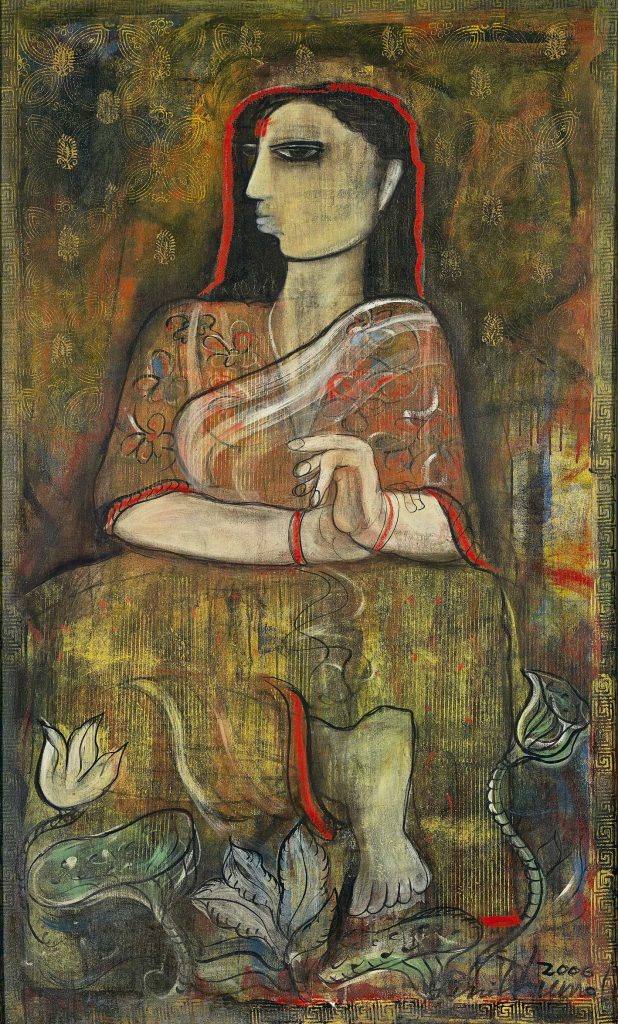
Rini Dhumal, Untitled, 2006. Asta Guru.
A multifaceted artist and a teacher, artist Rini Dhumal will always be remembered for the portrayal of the indefatigable strength of women through the course of her career. Drawing from myths, dreams, and several other symbolic references, Dhumal created goddesses like figures often placed in a meditative spiritual pose.
My muse is a woman, the shakti image. I don’t want to call it a cliché but as a woman, one is at the front. She is my forte. I explore women in all forms…I see the energy vibrating in women from villages to different classes. She is a juggler and she juggles so much in life that automatically she comes out to be a strong person
Bharti Kher
Leading Indian contemporary artist Bharti Kher is widely regarded for her signature style work, which is executed with a meticulous layering on the surface with “Bindi”. One of the most common symbolic elements of femininity amongst Indian women, Bindi has become an integral part of Bharti Kher’s practice. It was first used by the artist in 1995 when she was struck by a woman’s serpentine-shaped Bindi in a market and since then it has become the core of her art practice.
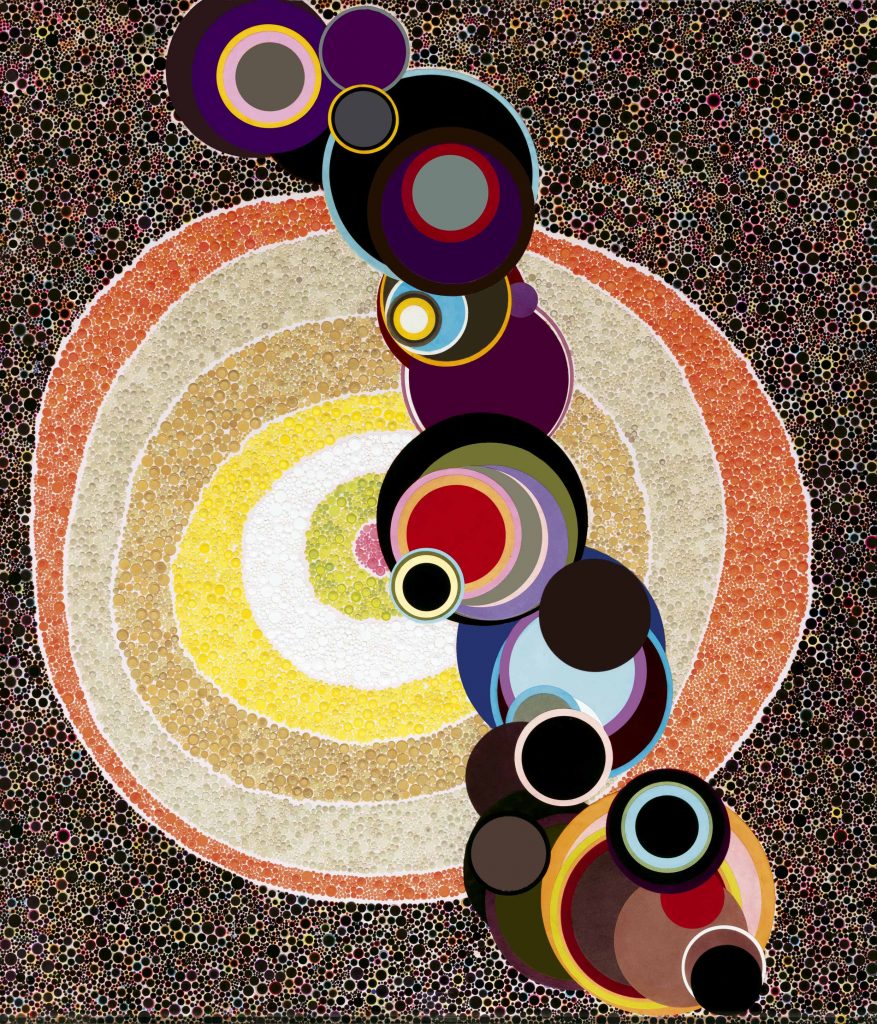
Bharti Kher, Untitled, 2015. Asta Guru.
Anju Dodiya
Artist Anju Dodiya is another important Indian woman artist whose hallmark style is rooted in introspection and self-awareness. Often autobiographical, her works commonly feature haunting self-portraits in different avatars. At the same time, she also draws inspiration from other mythical women from different cultures such as Daphne, Sita, Penelope, Arachne, and other magician-like characters who come alive on her illuminated theatrical canvases with elaborate costumes and masks.
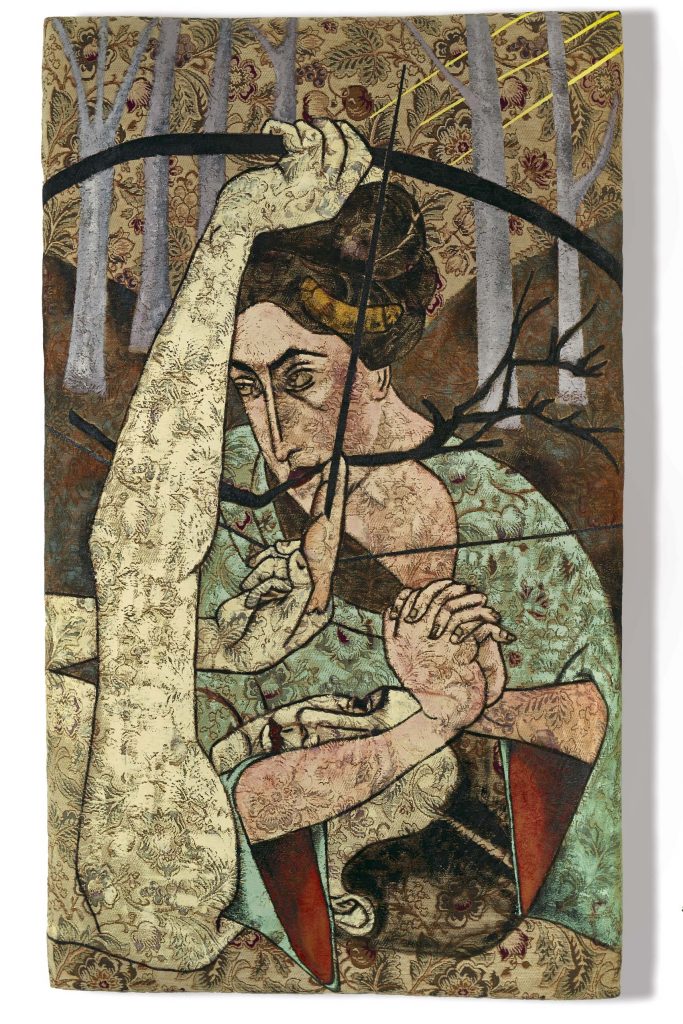
Anju Dodiya, Cloud Hunter, 2005. Asta Guru.
Rekha Rodwittiya
Themes of gender and identity form the cornerstone of the art practice by self-professed feminist Indian woman artist Rekha Rodwittiya. In order to tribute the indomitable strength and wisdom of the feminine, she places her everyday female characters in myriad settings and situations.
The female figure as a central image is neither accidental nor arrived at by chance in my work. It is consciously placed as an endorsement of female victory – as a symbolic trophy of the self for the self – to reinforce the embodiment of the female spirit as a vital axis to life itself.
Benita Fernando, interview with the artist, Mint, 9 Nov 2018.
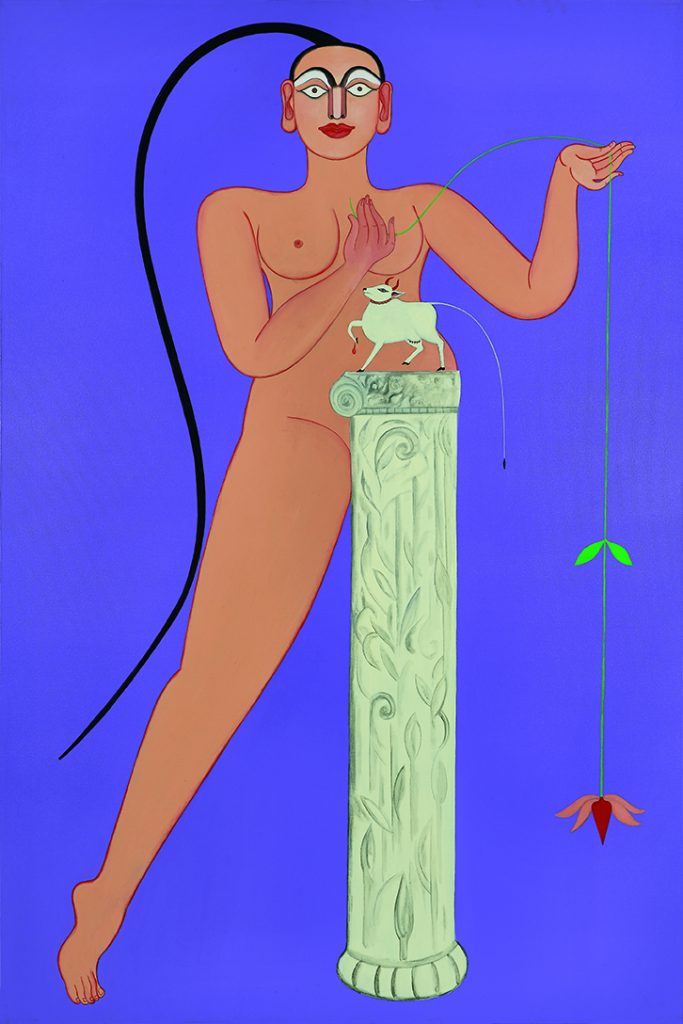
Rekha Rodwittiya, Rekha@50, 2008. Asta Guru.
Meetali Singh
Artist Meetali Singh’s works are an exploration of femininity that comes as an answer to self-posed queries that take the form of dreams on her lyrical canvases. Free from the boundaries of a beginning and an end, works by Meetali Singh embrace the viewers and sets a curiosity amidst the narrative.
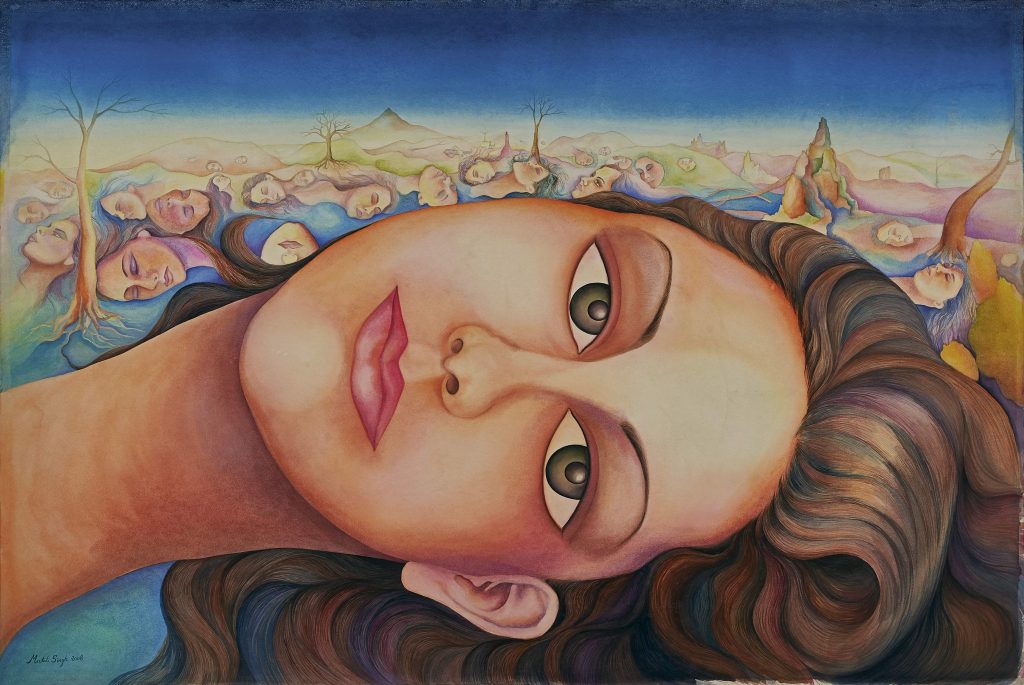
Meetali Singh, Untitled, 2008. Asta Guru.
Chitra Ganesh
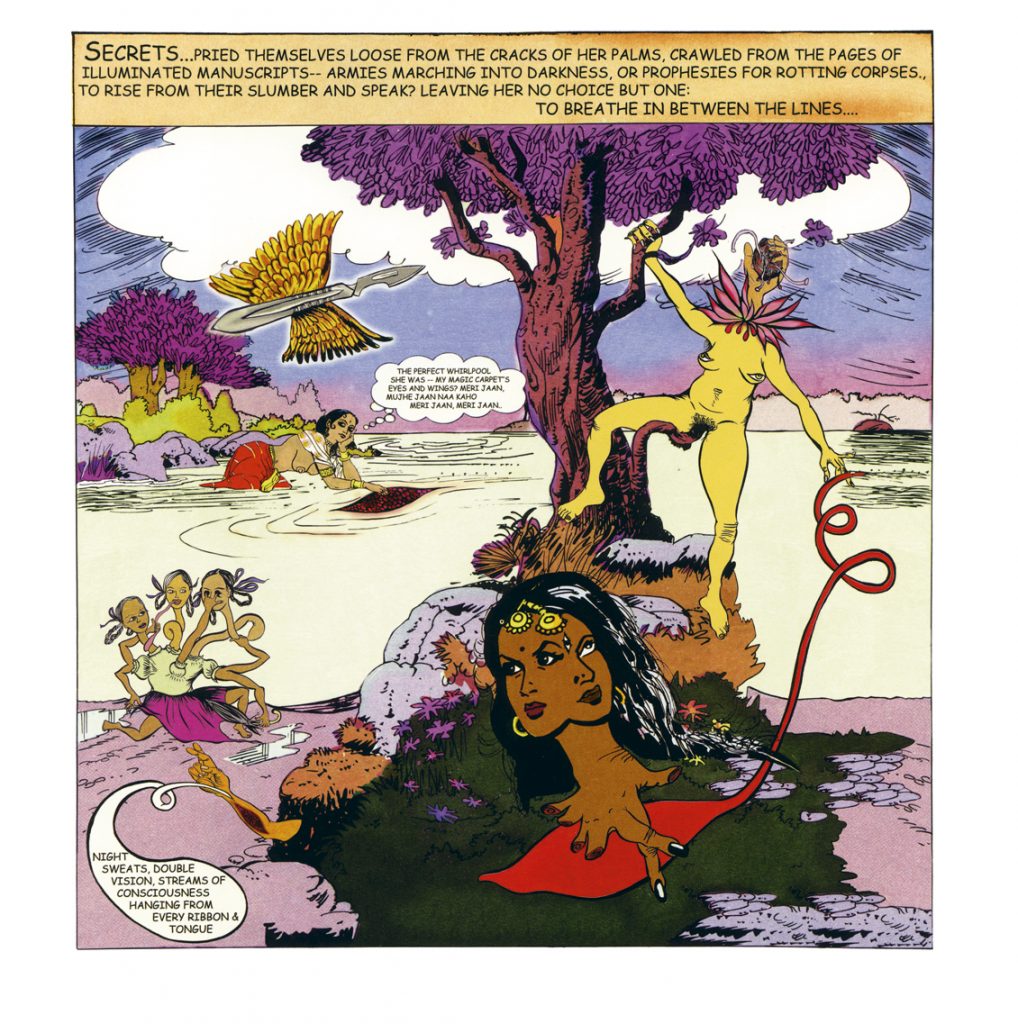
Chitra Ganesh, Secrets, 2007. Asta Guru.
An Indian-origin American artist, Chitra Ganesh thought her comic strip artworks challenge the idea of female subservience by borrowing heavily from the religious imagery and mass popular culture of India. Combining the elements of mythological iconography, science fiction, comics, surrealism, video games, and a host of other contemporary imagery, she expresses her own experiences to critique the existing gender hegemonic narrative and suggests the possibility to dismantle it.
There are several more Indian women artists on the landscape of Indian art who are using their art as a voice to communicate their perspective on the lives of Indian women.
Author’s bio
Sunny Chandiramani is the resident modern Indian art specialist at AstaGuru Auction House. She joined the auction house in 2013 and now has over seven years of experience in this industry. Since joining AstaGuru, Sunny has contributed to over 25 successful auctions. One of the things she cherishes about working in this segment is the opportunity to view firsthand the works of various modern Indian painters who have left quite a legacy. Being a veteran in this field, she understands not only the importance of each artwork but also the market fundamentals and statistics.
